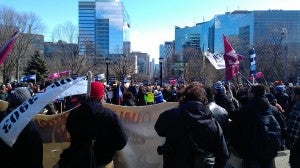On March 19, CUPE 3903 clearly communicated to the Employer what the Union needed to settle negotiations: Tuition indexation for all members of Units 1 and 3, a modest minimum of funding for members of Unit 3, and the introduction of LGTBQ as an effective employment equity category.
On March 24, the Employer responded to CUPE 3903’s demands through the provincially-appointed mediator:
- They agreed to sit down with the union within six months to create a plan for the implementation of the new employment equity category.
- They put forward language that addresses some of our concerns around tuition indexation. This includes offsetting tuition increases for all incoming members of the Union at the same rate, rather than at different rates as determined by when someone begins studying at York.
- However, much to the disappointment of the Union, the Employer ignored the Union’s proposal to establish a $12,500 minimum funding guarantee for Unit 3 members.
These are moves in the right direction. At a Special General Membership Meeting on March 26, CUPE 3903 members reaffirmed what they need to bring an end to negotiations:
- Tuition indexation that reverses the Employer’s re-interpretation of what that principle means. Members need both domestic and international students’ tuition rates returned to the 2005 level, and also need assurances that all incoming students are protected from future hikes. The Employer has proposed leaving rates at the 2014 level, which leaves international students paying about $7,000 more than they were two years ago.
- A minimum of monetary support for those Master’s students who are most poorly funded.
- An accelerated implementation of a plan that meets our employment equity concerns.
As a consequence, the CUPE 3903 Bargaining Team met on Friday morning (March 27) to craft counter-proposals to our Employer’s last offer. These include:
- Tuition indexation that accepts the framework of the Employer’s last offer, but with two important modifications: first, that all monies given to members to offset any future tuition increases will come in the form of funding, and not in the form of more work. Accepting offset monies in the form of work translates into working more for the same level of funding, which the Union cannot accept. Second, the base-year against which tuition raises are measured cannot be 2014, as suggested by the Employer, but must instead be 2012. This would ensure that the tuition hikes levied on International students would be reversed.
- A minimum guarantee for Unit 3 of at least $12,500. Many Unit 3 members already make more than this, meaning the Employer should be able to implement this proposal at a relatively modest cost.
- Sit down with the Union within three months, rather than six, to create a plan for the implementation of LGBTQ as an employment equity category.
Lastly, the Employer has proposed a back-to-work protocol that would see Units 1 and 3 receive only 92% of their pay. This neglects that members will still have to complete all of their duties when they return to work. It also neglects that there may be even more work to do, given the disarray that the Employer has created by attempting to re-open classes. As a consequence, the Union is demanding that members receive 100% of their pay, and that supervisors sit with Union members before work starts to determine how classes will move forward. The Union is also demanding that any interest levied on unpaid tuition during the strike be returned to our members.
The Union’s demands are more than reasonable, and are affordable within the context of the University’s operating budget of over $1 billion. Giving members tuition offsets that are indexed at 2012 levels would simply return money that, in the Union’s view, should have been returned already; adding LGBTQ to existing employment equity will cost nothing; offering Master’s students who are underfunded a higher minimum level of funding will cost little more than the salary now received by York’s president.
CUPE 3903 is confident that our Employer will recognize the legitimacy of these demands, and that members will be back to work in the very near future.

